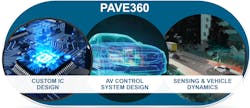Siemens' new validation program boosts simulation testing for autonomous vehicles
On May 15, Siemens unveiled a new simulation tool to advance the testing of autonomous vehicles.
Siemens AG introduced the PAVE360 pre-silicon autonomous validation environment, which it describes as a program established to enable and accelerate the development of innovative autonomous vehicle platforms.
The new tool establishes a design-simulation-emulation solution that scales all the way from the individual blocks of an autonomous vehicle's system-on-a-chip (SoC) IP, to the hardware and software on the SoC, to the vehicle subsystems, all the way up to the deployment of vehicles in smart cities. Siemens calls this chain of applications a "chip-to-city" approach, based on the increasing digitalization of the automotive industry.
Overall, PAVE360 aims to help speed chip design and software validation, and enable the creation of model-specific silicon for the first generation of self-driving cars.
"PAVE360 from Siemens enables everyone in the automotive value chain to develop custom SoCs, optimized for the performance, power, safety, thermal and form factor requirements of driver assisted and fully automated vehicles in a completely virtual environment," said Jim McGregor, principal analyst at TIRIAS Research in Siemens' news release of the new tool. “PAVE360 is part of a complete, closed-loop simulation solution from Siemens that allows designers to test everything from silicon development to full vehicle validation."
The new tool provides a fully virtual environment for collaboration among suppliers of various stages of autonomous vehicle chips. Part of that relies on extending digital twin simulation beyond processors to include everything from hardware and software subsystems, to full vehicle models, the fusion of sensor data, traffic flows, and up to the simulation of smart cities that autonomous vehicles will eventually travel.
“PAVE360 represents the first output of an innovation process born from the combination of Mentor and Siemens employees, ideas, and technologies two years ago,“ said Ravi Subramanian, vice president and general manager of the IC Verification Solutions Division of Mentor, a Siemens business. “PAVE360 from Siemens delivers a comprehensive program to support the deep, cross-ecosystem collaboration necessary for our customers to develop powerful custom silicon and software solutions to power the autonomous vehicles revolution.“
Siemens said the new tool's offering of full, closed-loop validation of the sensing and decision-making basis of autonomous driving systems relies on rigorous pre-silicon validation of rules-based and artificial intelligence-based approaches of safe self-driving, in the context of the full digital twin.
PAVE360 is currently on display in the Center for Practical Autonomy Lab in Novi, MI. Siemens said the tool is designed to serve as the industry-standard verification and validation programming for modeling solutions in the automated driving ecosystem. The company's news release also emphasized how PAVE360 helps democratize chip design, which will enable carmakers, chipmakers, tier one suppliers, software houses, and other vendors to collaborate on the development and customization of complex silicon devices for autonomous vehicles.


